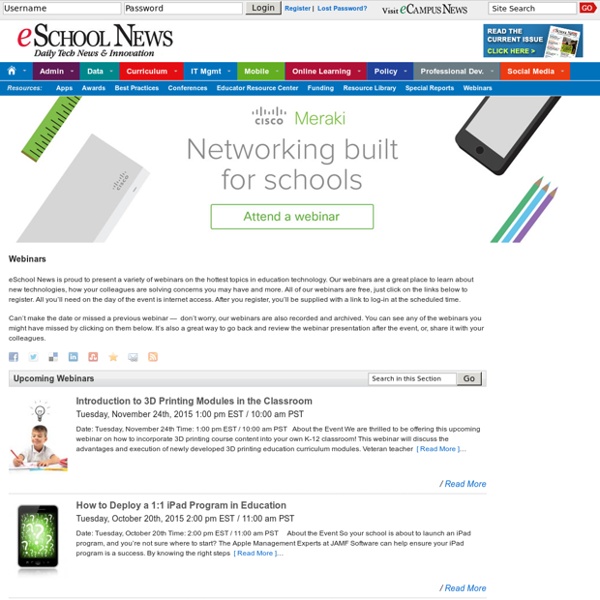Bloom's taxonomy and English language learners
Thinking Skills and English language learners English language learners should be asked critical thinking questions from all levels of Bloom's Taxonomy. Some of the tasks on the taxonomy are difficult for ELLs because they lack the language and vocabulary to work in English. However, teachers need to ask questions from all levels of the taxonomy that are age appropriate and at the English language level of the English language learners. Even very young children can work at the Synthesis and Evaluation levels.
Web 2.0 Science Tools
By Laura Turner The following web2.0 sites would be useful for science educators at the high school and middle school level. Some would also be appropriate for higher elementary grade levels. There are many new ‘tools’ or websites that take advantage of the higher speed and bandwidth of today’s Internet. Web 1.0 tools/websites were text based and web2.0 tools/websites are designed for full-motion video, 3D animations and are generally interactive in some manner. Web 2.0 can also be described as the second round of new technology development and adoption.
Success Workshops - Student Success
The Office of Undergraduate Studies provides a series of workshops throughout the semester to help you succeed both in and out of the classroom. Consult the calendar for the dates and times of the Success Workshops and the Scholarship Workshops. Face-to-Face: How to Meet with Your Professors Want your professor to know you on a more personal level, but don’t know how? Tired of being just another number?
Conferences, Webinars, Workshops
Webinar: October 13 Maximizing Your Small Business Tax Savings Webinar November 10 Understanding the WISC-V Pre-Conference Training November 3 MBTI Training, Therapeutic Training Scottsdale, AZ Pre-Conference Workshops November 4 Financial Aid, Learning DisabilitiesScottsdale, AZ
Teach Up: Create a classroom that works for all students
Teachers Helping Every Student Reach Their Potential: Teach Up I never get tired of reading the thoughts and ideas that Carol Ann Tomlinson shares with the educational community about how to meet students’ needs. Having seen her in action as a presenter, she is very captivating and convincing. The books and articles she has authored, many of which I have read, are scholarly, well-written, and lay out a vision for excellence in teaching. In the February 2012 edition of Educational Leadership, she co-authored an article with Edwin Lou Javius titled, Teach Up for Excellence. It was one of the most inspiring pieces I have read and gave me a great deal to think about in my work with teachers.
Edutech for Teachers » Tech Tip of the Week
Gooru: Science & Math Resources February7 Resource: Gooru is new service whose mission is to provide teachers and students with a variety of multimedia resources – videos, diagrams, interactive displays, documents and quizzes – related to 5th–12th grade science and math topics.
Free Workshops For Teachers
Personal Learning Networks: The Future of Learning Presenter: Will Richardson Learning is social, we've all known that.
Webinars
A collection of free virtual broadcasts, including upcoming and on-demand webinars. Browse our premium webinars here. All webinars are accessible for a limited time after the original live streaming date. Participation certificates are not provided, but live viewers receive a post-event confirmation email.
THE FOUR SKILLS
Thursday, March 22, 2012 Here are some tools that can help you build I.
Beyond 2012: Why the World Didn't End
Beyond 2012: Why the World Didn't End If you're reading this story, it means the world didn't end on Dec. 21, 2012. Despite reports of an ancient Maya prophecy, a mysterious planet on a collision course with Earth, or a reverse in Earth's rotation, we're still here. The Mayan connection "was a misconception from the very beginning," says Dr.
Fun, in practice
At the end of January, I wrote a post inspired by Volkswagen’s Fun Theory competition. (If you missed the original post, it’s here: The Fun Theory in Language Learning) As often happens, as soon as I had “fun” on the brain, I started seeing posts and information related to this topic all around me in cyberspace! Since fun is always a good thing to have on the brain, I’d like to share a few of the blog posts, discussions, and resources that I’ve enjoyed on this topic. One of ELT Chat’s January 27th Twitter discussions was dedicated to the Role of Humour in the EFL Class. There are a lot of great resource links, and ideas in the Dave Dodgson‘s chat summary.
50 Years of Incredible Space Images From the European Southern Observatory
This week marks the 50th anniversary of one of the world’s leading astronomical institutions, the European Southern Observatory. In honor of ESO’s birthday, we take a look at some of its most stunning shots of the night sky, amazing objects in space, and the organization's beautiful telescope facilities. ESO started when astronomers from five European countries – Belgium, France, Germany, the Netherlands, and Sweden – came together on Oct. 5, 1962 to build a telescope in the Southern Hemisphere. Having a large telescope south of the equator gave these member states access to unprecedented clear skies and celestial objects that simply can’t be seen from the Northern Hemisphere, such as the Magellanic Clouds.



